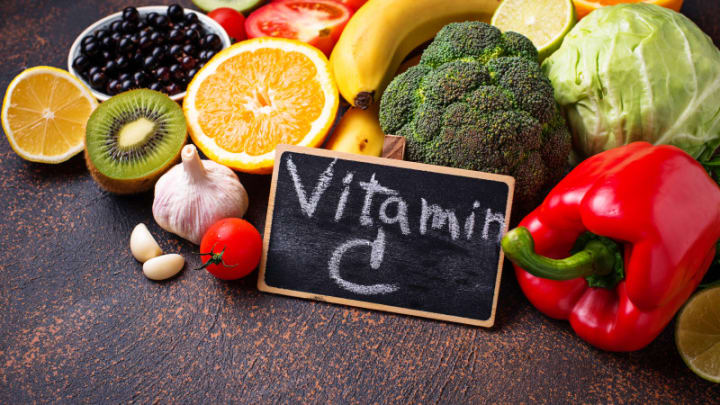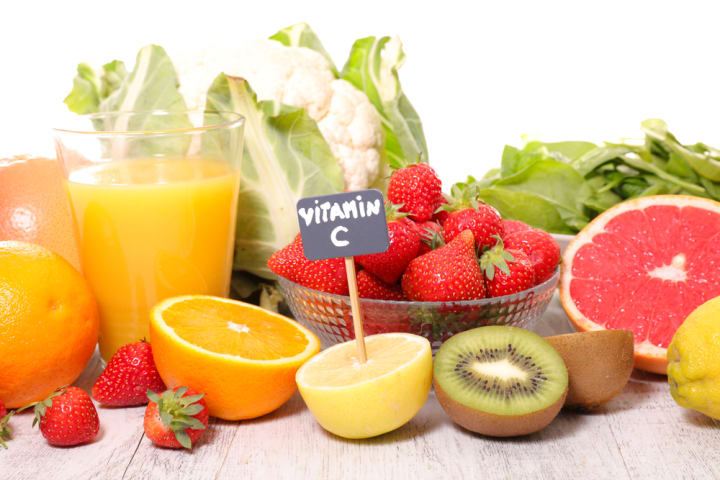Vitamin C - why is it so important?
Did you know that... contrary to popular belief, lemon is not the richest source of vitamin C?

Black currants contain three times as much of this valuable component. In addition, rich in vitamin C are also rosehips, red and green peppers, Brussels sprouts, cauliflower, spinach, oranges, tomatoes and cabbage. What else is worth knowing about this vitamin?
Vitamin C - know its benefits
A properly functioning immune system is the most effective protection of our body against various pathogens, including bacteria and viruses, which are the cause of infections and colds, especially intensified during the period of autumn cold. One of the key factors building natural human immunity is a balanced diet rich in vitamins and minerals. Its inseparable element should be vegetables and fruits rich in vitamin C, which activates the immune system of our body and supports its operation already at the cellular level.
Discovered just over 100 years ago, vitamins are organic compounds indispensable for the proper functioning of the entire organism - they are responsible for the proper course of metabolic processes taking place in it, conditioning our health and well-being. Vitamin C, also known as ascorbic acid, is the most popular among the whole range of valuable ingredients. This water-soluble chemical compound, which is a derivative of glucose, is widely recognized as an ally of the body's defensive functions and a means of preventing infections and alleviating cold symptoms.
What do we have in common with the bat?

Primates, as well as guinea pigs and some bat species, lack the ability to synthesize vitamin C in the body. This genetic condition forces them to meet their ascorbic acid needs using external sources. Fortunately, vitamin C occurs naturally in some components of our daily diet, mainly vegetables and fruits. Scientists have also learned to synthesize it in laboratory conditions, so it can be used as a food supplement or a dietary supplement.
Vitamin C is ubiquitous - we can find it on our plate and in the household medicine cabinet. However, in times of increased demand, its deficiency can lead to disruption of the immune function. Taking care to maintain an optimal level of vitamin C in the body is particularly important during infection and convalescence after illness, when our immune system is weakened by the action of bacteria and viruses.
Increased demand for vitamin C also applies to women during pregnancy and lactation, when the child draws nutrients from the body of its mother. According to the recommendations of WHO and FAO experts, from the first days after birth, an infant should take 25 mg of vitamin C per day in its diet. This amount increases after the age of 6 months to 30 mg. Pregnant women are recommended to consume 55 mg, and nursing mothers 70 mg of ascorbic acid per day.
In a healthy body... healthy cells
One of the most valuable properties of vitamin C is its antioxidant potential. Ascorbic acid is one of the best studied antioxidants - compounds with the ability to neutralize free radicals that are harmful to our health. The production of the latter is a natural derivative of the body's life processes, such as respiration or digestion, which cannot be inhibited or eliminated. Optimal amounts of free radicals do not have a negative impact on our health, but when they are in excess, they have a destructive effect on cells, impairing their ability to survive, grow, reproduce or produce energy, and consequently disrupt the proper functioning of the entire body. As an antioxidant, vitamin C has a protective function - it eliminates harmful particles, preventing oxidation and cell destruction. It strengthens the body's immune system and reduces the risk of many serious diseases, including hypertension, diabetes, and atherosclerosis.
Vitamin C, therefore, is not only a popular remedy used during infections, but also a potential cure for serious, deadly diseases. A study by American researchers at the University of Kansas found that intravenously administered high doses of vitamin C combined with chemotherapy slowed the progression of ovarian cancer and even accelerated the death of cancer cells.
At the heart of immunity

High concentrations of vitamin C are found in the cells of the immune system - phagocytes and lymphocytes, which fight off bacteria and viruses that attack the body by producing active antibodies. Ascorbic acid supports the production of immune cells responsible for fighting infections, stimulates their growth, activates their functions, and inhibits the processes of their death, thanks to which it plays a key role in building our body's natural protective shield. In addition, vitamin C supports the absorption of difficult-to-absorb non-heme iron obtained from plant products, preventing the occurrence of debilitating anemia.
Scientifically proven effectiveness
Reaching for vitamin C at the first symptoms of the autumn cold is a natural reflex for most of us. Although it has not yet been proven that a single dose of ascorbic acid can prevent infection at the onset of symptoms, observations have shown that regular use of high doses of ascorbic acid alleviates the cold and shortens its duration. The analysis of research conducted over the last 60 years by scientists from the University of Helsinki proves that regular intake of vitamin C above 200 mg per day shortens the duration of infection in children by 14% and in adults by 8%. It has also been proven that taking vitamin C reduces the frequency of falling ill. It was confirmed, among others, by a study conducted in Japan on a group of 305 patients. Among people who for 5 years took ascorbic acid in the amount of 500 mg per day, the risk of getting a second cold or more diseases decreased by about 70%. The duration of a runny nose, one of the more troublesome symptoms of infection, was also significantly reduced.
Prevention is better...

Human organism does not have the ability to store vitamin C - its excess is excreted with urine, therefore every day we should take care to cover the demand for the component so important for the proper functioning of the immune system. Natural immunity is a shield which protects us not only from the common cold, but also reduces the risk of more serious health complications.
Ascorbic acid is the most popular, but not the only ingredient that promotes immune enhancement. Vitamin C's allies in building a strong human immune system include vitamin D, DHA acid and honey, recommended by WHO as a safe cough treatment for young children. And since we are talking about the youngest - remember that we are not born "immune". The immune system of a toddler matures gradually and its proper development may be disrupted by recurrent infections. In the case of this sensitive group of consumers, prophylactic measures consisting in supplementing the diet with components which build up immunity from the first days of life are extremely important.
About the Creator
Ruslan Bond
Interesting and useful articles






Comments
There are no comments for this story
Be the first to respond and start the conversation.